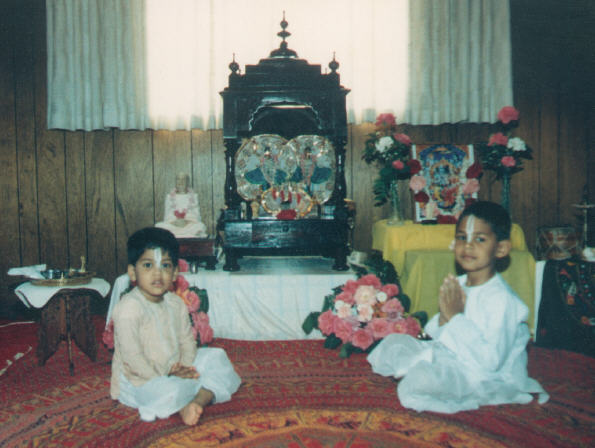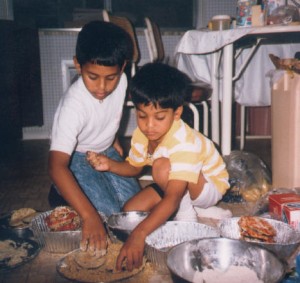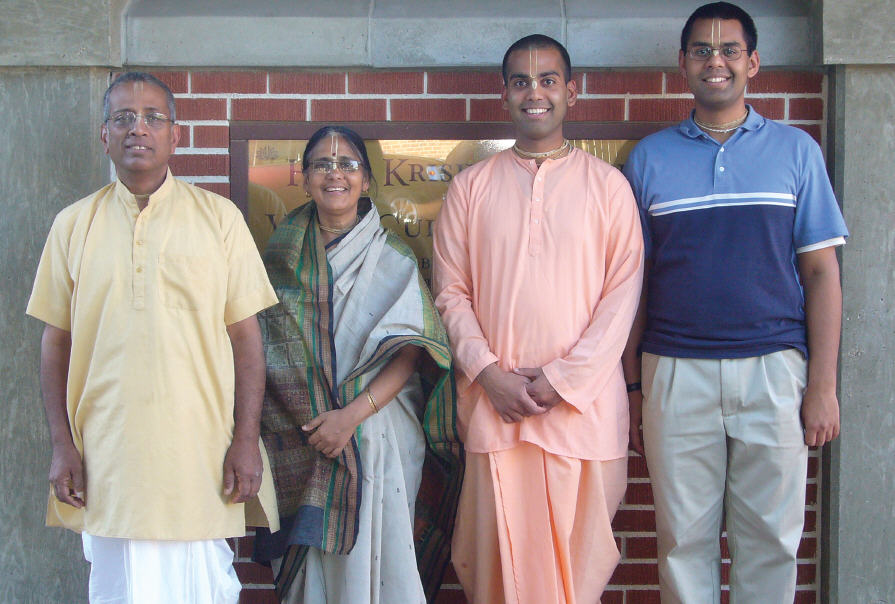Guidance from a mother who homeschooled her two sons, and who both are now devotees and scholars.

As our children reached school age, my husband and I began seriously considering our options for their formal education. Like many devotee parents, our aspirations were straightforward: we wanted to instill deep Krishna conscious values in our children while giving them a solid academic education. We investigated area public schools and tried a private school for a while, but we were disappointed in one way or another. We then considered sending our children to a gurukula boarding school in another city, but there were few of these schools to choose from, and the ones that existed were too far away.
Besides, we needed each other as a family. Boise, Idaho, USA, is a small town, and when we moved to Boise in 1986, there was no temple or devotee community here. So my husband and I started a small center in our home, hosting regular programs on Sundays. It was then that we came upon the concept of home schooling, which was becoming increasingly popular in the USA. We purchased a ready made home schooling curriculum, but soon gave it up and put together our own lesson plans, using Srila Prabhupada’s books as the main textbooks. After several years of home schooling in this way we had no doubt: the process was working and our children were doing well both academically and spiritually. The small center grew into a beautiful midsize temple for their Lordships Sri Sri Radha-Bankebihari our protectors and proprietors. The temple became the focus of many of our home schooling activities.
Soon after our two sons graduated from university, I began receiving calls from young devotee parents who had heard of home schooling and wanted guidance in teaching their own children. They were determined to give their children a Krishna conscious education grounded in strong spiritual, moral, and academic values, but they were unsure how to go about it. I helped them the best I could. Soon these queries led to home schooling seminars, where I could offer a more systematic presentation and personally interact with more parents. As interest grew among devotee communities, I was invited for seminars in cities throughout the United States, India, and England. As more parents adopted home schooling to educate their children, I found satisfaction in their success.
Wherever I went parents asked me to write a book to systematically explain the method of home schooling I had developed using Srila Prabhupada’s books. Five years ago I began writing down my own home schooling experiences, researching Srila Prabhupada’s instructions on education, and listening to parents’ questions, ideas, and experiences. This book is the result of that process.
Basic Principles of Krishna Conscious Home schooling
Home schooling can be part of a Krishna conscious lifestyle, but it is a mistake to think Krishna consciousness is simply an aspect of home schooling. A Krishna conscious lifestyle should be the focus of home schooling. That is, we should be inspired to raise our children as good devotees rather than focusing only on their scholastic achievements, with Krishna consciousness taking second place. Srila Prabhupada’s books are of a high spiritual caliber, so if we base our curriculum on his books, academic achievement will follow naturally.

What does it mean for children to live a Krishna conscious life? Prabhupada explains this in simple terms: “Simply follow the program of the elders. Let the children associate as much as possible with the routine Krishna conscious program, and when the others go out for working and business matters, the children can be given classes.” (Letter to Aniruddha Dasa, March 7, 1972)
This is what we tried to do in our own home schooling. The children lived at home just as they would in a gurukulawith a few adjustments. We held our own morning program, and after breakfast prasada we studied the Bhagavatam for two or three hours every day. This study became a major part of our home schooling curriculum, and through the Bhagavatam we covered a number of subjects. Then after our study we applied what we were learning in our practical daily activities. For example, we would go out preaching, giving classes on Krishna consciousness at local schools. We also wrote and rehearsed devotional plays, organized devotional festivals, performed deity worship, distributed books at local events, and went out on harinama. There was never a dull moment for us; home schooling was so filled with Krishna conscious activities that there was no time for anything else.
Srila Prabhupada’s idea for the education of our children was to make them well-rounded devotees who are expert in sastra, eager to give Krishna to others, and steady in their personal practice. He once said, “We are interested to open [a] school if there is education for Krishna consciousness. But we are not inter-ested in so-called godless education. That is not our business.” (Lecture, November 13, 1973, Delhi)
Since Krishna is the source of all knowledge, if we understand and love Him, then all sorts of knowledge will follow. Everything material and spiritual comes from Krishna. This is why Srila Prabhupada emphasized spirituality as the goal of education; he knew that Srimad-Bhagavatam has everything in it needed to understand both the material and the spiritual worlds. Srila Prabhupada envisioned our children receiving not only an academic education but developing godly character as well. To have good character one must have God in the center of his or her life; otherwise, there is no impetus to check one’s actions. Krishna has many wonderful qualities, such as kindness, wisdom, peacefulness, and forgiveness, and a godly person can develop these same qualities. Good character comes from living a pure and simple life dedicated to hearing and chanting the holy names, the basis of all learning. Since the main purpose of home schooling is to raise a Krishna conscious child, a Krishna conscious lifestyle must be the basis for home education.
An important element in preparing the home for the homeschooled child is the introduction of deity worship. Deity worship is essential in the education and training of our children because it trains them to be clean and punctual and to focus the mind on Krishna. Bhaktivinoda Thakura emphasizes the importance of deity worship in Chapter 11 of Jaiva-dharma: “The religions that have no provision for deity worship face the danger that those children born into the religion and those just beginning spiritual life both of whom may have little or no understanding of or deep faith in the Godheadmay become overtly materialistic and even develop aversion toward the Supreme Lord as a result of the absence of a deity form on which to fix their minds. Therefore deity worship is the foundation of religion for general humanity.”
Prabhupada also recommended deity worship for all householders. Householders who worship deities at home can bring up their children in a pristine atmosphere, in which they demonstrate practically how to love Krishna. Parents can teach their children the importance of bowing down, chanting, dancing, and performing services such as cleaning the temple, making flower garlands, decorating the deities, and observing festivals. Right from the beginning, children can be taught to offer everything to the deities before using it themselves, including food, new clothing, and their talents. In this way a child can develop natural attraction for the Lord.
Children have a natural tendency to play, and instead of using this urge frivolously they can play with Krishna, decorate Him, feed Him, and worship Him. When they are young they can worship and play with Krishna dolls, and as they mature they can assist their parents in deity worship. In a letter to his disciple Stoka Krishna Dasa (June 13, 1972) Prabhupada wrote: “The children should always be instructed by taking advantage of their playful mood and teaching them to play Krishna games like pretending to be cowherd boys, cows, peacocks, or demons, and in this way if they always think of Krishna by playing just like they are actually present in association with Krishna, then they will become Krishna conscious very quickly. In addition, there should be a little ABC, then prasada, then worshiping the deity, then more playing Krishna games, some kirtana, a little more ABC, like that. In this way, always keep their minds and bodies engaged in different activities because children are restless by nature so they will want to change often.”

Prabhupada gives his own childhood as an example. “So children, they generally imitate the parents’ habits or activities. So fortunately we had the opportunity of getting such a father. So we are imitating our father. In my childhood I imitated my father. He was worshiping the deity of Krishna. So I asked him, ‘My dear father, I shall worship. Give me the deity of Krishna.’ So he gave me a little deity of Krishna and Radha and I was imitating. So beginning of life . . . So these are actually facts. Maharaja Parikshit also, he was playing with Krishna, Krishna dolls. Just like Mira Bai. She was playing with a Krishna doll and later on she became a very high grade devotee. So these chances are there.” (Lecture, September 16, 1966, New York)
Prabhupada writes of Uddhava’s early deity worship in his purport to Srimad-Bhagavatam 3.2.2: “From his very birth, Uddhava was a natural devotee of Lord Krishna, or a nitya-siddha, a liberated soul. From natural instinct he used to serve Lord Krishna, even in his childhood. He used to play with dolls in the form of Krishna, he would serve the dolls by dressing, feeding, and worshiping Them, and thus he was constantly absorbed in the play of transcendental realization. These are the signs of an eternally liberated soul.”
We introduced deity worship for our boys when they were three and five years old. They had their own four-inch Gaura-Nitai deities, to whom they became attached. I was with them when they did their worship. We would take several hours to dress, bathe, and decorate Them with ornaments. Then we would make an offering followed by arati and kirtana. Sometimes they would spill water or drop paraphernalia but that is to be expected of small children. Overall, they took care of Gaura-Nitai with love and respect. What was amazing was how they were absorbed for two to three hours without being distracted. They loved the worship. Anything they ate or drank they wanted to offer to their deities, and they would remind us to do the same. It created a transcendental mood in the home, and it was easy for them to understand that everything should be done for Krishna’s pleasure. If they were disobedient it did not take them long to give it up because of their desire to please Gaura-Nitai.
When children engage in deity worship, they understand that Krishna is a person, a friend, and their worshipful object. He is approachable and can reciprocate with His worshipers. Deity worship is a natural way to evoke love of Godhead in children. No amount of explaining can do the same.
Another side benefit of deity worship is that children learn the importance of cleanliness. They learn that they must bathe before they touch the deities, and that even though Krishna is their friend, He is not to be treated casually or like an ordinary person. It becomes easy to make Krishna the most important family member, who needs to be kept satisfied and happy.
The Scriptures As the Basis of Home schooling
Srila Prabhupada said that from the very beginning children “should be taught Sanskrit and English so in the future they can read our books. That will make them M.A., Ph.D.” (Letter to Jagadisa Dasa, April 6, 1977) The knowledge in Prabhupada’s books is advanced. Children can be well-educated, happy, satisfied, and even go back to Godhead by reading them. As evident in many of his lectures, it is clear that Srila Prabhupada desired the children in his gurukulas to read Srimad-Bhagavatam. On July 12, 1974, speaking on Bhagavatam (1.16.22), Prabhupada confirmed that the Bhagavatam would equip any child to know every subject. They would need nothing else. Please read the following quotation carefully:
So in Srimad-Bhagavatam you will find everything. Whatever is necessary for the advancement of human civilization, everything is there described. And knowledge also, all departments of knowledge, even astronomy, astrology, politics, sociology, atomic theory, everything is there. Vidya-bhagavatavadhi. Therefore if you study Srimad-Bhagavatam very carefully, then you get all knowledge completely. Because Bhagavatam begins from the point of creation: janmady asya yata˙.
By giving them this foundation, children become confident of their spiritual identity and also do well academically. Prabhupada’s books inspire us to use logic and critical thinking, which are the main elements of academic education. Even a basic understanding of Bhagavatam philosophy far exceeds the level of thinking found in most college courses.
Srimad-Bhagavatam covers all subjects. By teaching children through the Bhagavatam, they have a head start on all other subjects. Later, when they have to study these other subjects through nondevotional books they will have the proper Vedic perspective and not be misled into atheistic or materialistic thinking.
It is easier to study the Bhagavatam than the Bhagavad-gita with children because the Bhagavatam contains stories. It also contains all the philosophy of the Bhagavadgita, so there is no loss in focusing on the Bhagavatam. We have seen that even a six-year-old can learn to read directly from Prabhupada’s books, and because of the books’ potency the child’s language skills quickly increase. Once children have a good command of language, they can master any subject.
Prabhupada wanted all subjects to be taught in a Krishna conscious manner: “As soon as possible we should open our own school and teach children Krishna consciousness through English medium; that is one of our programs. Our school will not be government recognized because we cannot follow the government syllabus. We want to teach only Krishna consciousness. . Try to introduce immediately Krishna conscious instruction to the students through English medium . . . Our girl disciples may be engaged for teaching them a little English grammar, reading and writing, geography, arithmetic, history, Sanskrit, but all of them should be Krishna conscious that is the bhagavata program.” (Letter to Giriraja Dasa, April 12, 1972)
